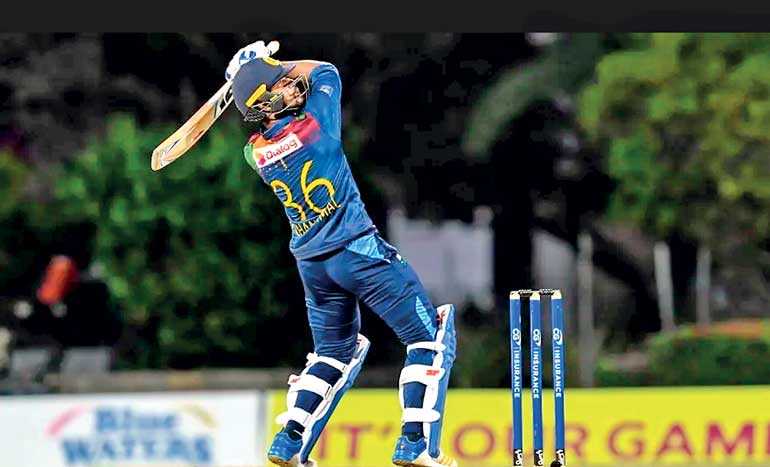Friday Feb 20, 2026
Friday Feb 20, 2026
Tuesday, 9 March 2021 01:45 - - {{hitsCtrl.values.hits}}

Kieron Pollard of West Indies poses with the trophy at the end of the 3rd and final T20i match between Sri Lanka and West Indies at Coolidge Cricket Ground in Osbourn, Antigua and Barbuda on 7 March – AFP
By Madushka Balasuriya
|
Fabian Allen of West Indies celebrates winning the 3rd and final T20I match between Sri Lanka and West Indies at Coolidge Cricket Ground in Osbourn, Antigua and Barbuda on 7 March - AFP
|
Fabian Allen shone with both bat and ball, affecting the game at the start and finish, as the West Indies secured a hard-fought three-wicket win against Sri Lanka in the deciding third T20I in Antigua and clinched the series 2-1.
After registering figures of 1 for 13 from his four overs – three of which had come in a powerplay period that saw Sri Lanka score 27 runs for the loss of three wickets – Allen applied the finishing touches with the bat to seal the game for West Indies.
His six-ball 21, inclusive of three sixes off Akila Dananjaya in the 19th over, came when Sri Lanka sniffed a chance, created once again by their bevvy of spinners.
Chasing a modest 132, the home side looked to have got off to the ideal start, registering 53 for 1 in the powerplay. But the Sri Lanka spinners once more proved a handful and pegged the West Indies back.
Wanindu Hasaranga was again the main threat and dismissed Evin Lewis and Lendl Simmons to finish with figures of 2 for 13. Lakshan Sandakan (3 for 29) and Dushmantha Chameera (2 for 23) also reaped the benefits of the pressure created by Hasaranga but with a target that low, the West Indies batsman knew they just needed one bowler they could target, and they found that in Dananjaya.
After his redemption in the second T20I following his mauling at the hands of Kieron Pollard in the opening game, Dananjaya struggled with his control this time around as he went wicketless in his four overs and gave away 53 runs.
Earlier, an unbeaten stand of 85 – Sri Lanka's highest in T20Is for the fifth wicket – between Dinesh Chandimal and Ashen Bandara had dragged the visitors to a respectable, if not quite competitive, 131 for 4.
After the spin of Allen and Kevin Sinclair had limited Sri Lanka inside the powerplay, the West Indian seamers took over. On a surface that was even slower than those in the first two games, the hosts almost exclusively dealt in slower deliveries, forcing the Sri Lanka batsmen to grind out runs.
It was only some late hitting from Bandara that ensured the visitors scored as much as they did, but despite the best efforts of their spinners, it was always unlikely to be enough – especially with the number of match-winners the West Indies have in their ranks.
West Indies out-gamble Sri Lanka
In the last game, Sri Lanka had bowled out their main bowlers by the 16th over, but it paid off in spades as by that point the game was as good as won, with all of the West Indies big-hitters back in the pavilion.
This time around West Indies were a little more calculated in their approach; first they brought in an extra batsman in Rovman Powell in place of Fidel Edwards, then, aided by virtue of having a modest target to chase, they bided their time, playing out dot balls when necessary, safe in the knowledge that a few big hits were enough the turn the game in their favour.
And so it panned out, with no less than six West Indies batsman hitting at least a six in their innings - a stark contrast from the two sixes hit by Sri Lanka, both by Bandara.
For Sri Lanka, by the time the 19th over rolled around, they were left with having to either throw the ball to part-timer Danushka Gunathilaka, who despite conceding only 11 from his three overs could not be relied on at the death, or Thisara Perera, who was woeful in that last game, or Dananjaya, who can be effective but was off his game. In the end, they went with Dananaya – though it's unlikely any of the other choices would have been any more effective.
Chandimal and Bandara adapt to the pitch
While Sri Lanka's top order failed to come to terms with a sluggish pitch, thankfully for them Chandimal and Bandara were around to bring some sense back into proceedings.
But aside from the odd boundary, neither batsman looked particularly fluent. As such it very much was a case of getting runs however possible, especially with the West Indies bowlers taking the pace off the ball at every opportunity. The fact that Chandimal's most productive shot on the way to his fifth T20I half-century was the flick, with 22 runs coming off it, speaks volumes.
Their unbroken partnership of 85 from 63 deliveries took on even more importance, considering when it began Sri Lanka were teetering at 46 for 4 midway through the 10th over.
Hasaranga's reputation keeps growing
Sri Lanka's spinners usually burst on to the scene, either with an aura of mystery radiating off them, or an unusual action in tow – or in the case of Rangana Herath, they remain hidden away in the shadow of an all-time great before a late-career renaissance. But rarely does a player improve on the job as much as Hasaranga has.
Yes, he has picked up wickets in nearly every T20I game he has played, but the degree of improvement his game has seen in the past year cannot be understated. The main upgrade has been the control with which he now bowls his googly, which has accounted for a large portion of his recent wickets. In this game, it was the googly once again that brought him early success, trapping the dangerous Evin Lewis lbw.
Hasaranga also showcased his adaptability, called into bowl inside the powerplay after Dananjaya failed to have the same impact as he had in the previous game. As is now almost expected, he delivered immediately. After a chance off his first ball – a low full toss to Simmons – was dropped by Danushka Gunathilaka at long-on, he dismissed Lewis three balls later. In his next over, he was the recipient of a brain-fade from Simmons, who found himself stranded down the wicket as Dickwella completed an easy stumping. But despite Hasaranga’s best efforts Sri Lanka simply didn't have enough runs in the bank.

Dinesh Chandimal's half-century went in vain – AFP